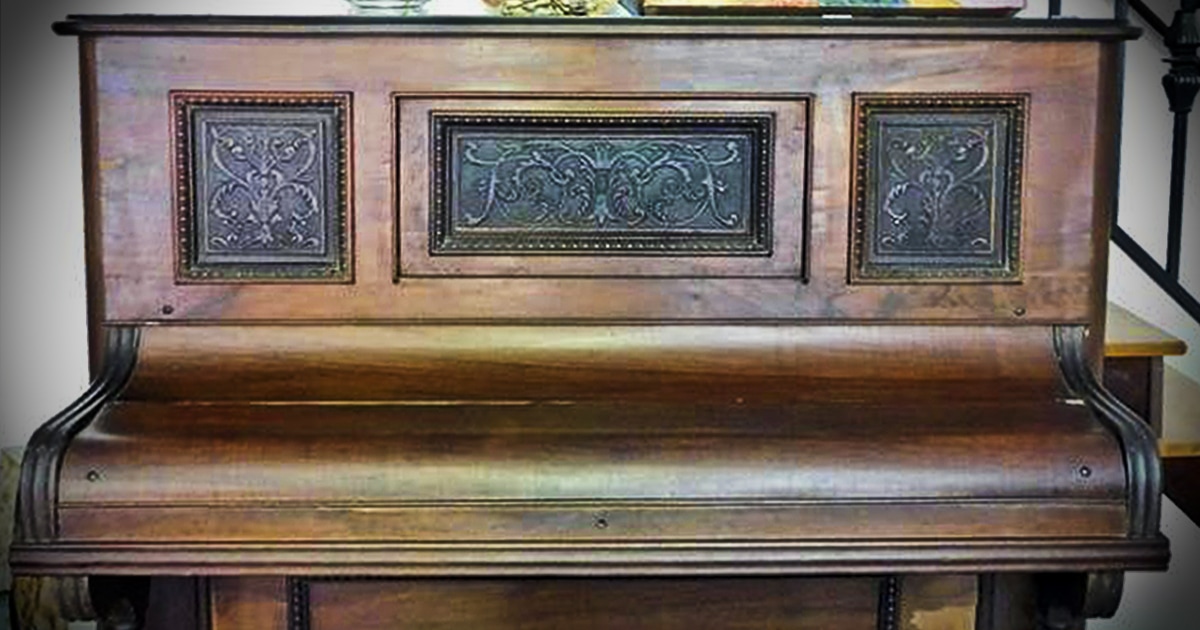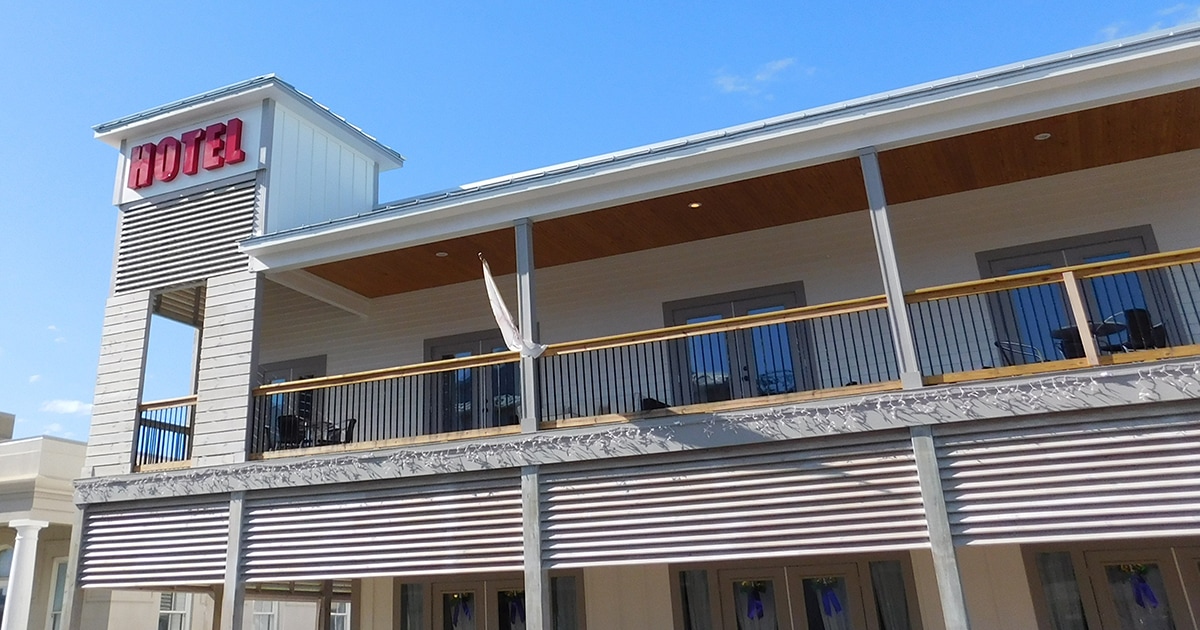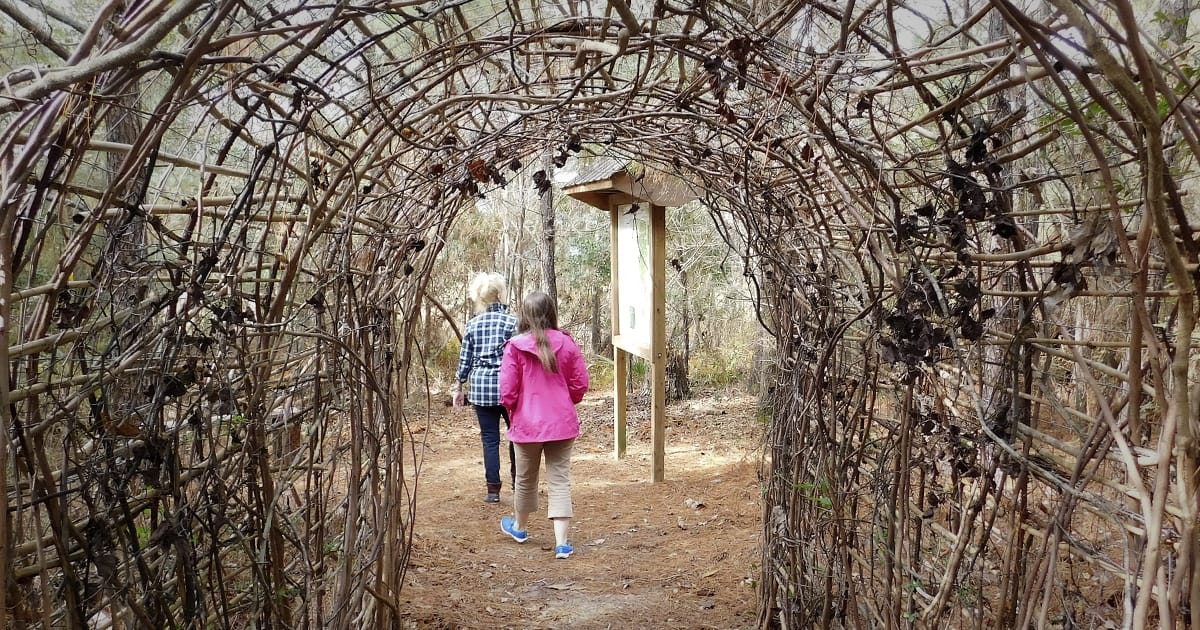What Katy Did
Award-winning author Rheta Grimsley Johnson introduces a moving new book by noted journalist John Branston.
“Watch out for snakes!” I warned.
“Kaboom!” yelled the dam-destroyers. They were fearless. That’s where I’ll keep Katy Branston. In the hollow, in the branch, in the box of faded snapshots under the bed. For somewhere there is a photograph I took of her that dam-building day. She is standing with her father, mother and brother, on the side deck where I’d line them all up each annual visit. The Branstons, a handsome couple, had such beautiful children that you felt compelled to document their big eyes and pinch-able cheeks. I once tried to sell my publisher on a photograph of Katy’s brother Jack for a book cover. I am talking cute. In 2014 I received an email from Katy announcing she was leading a bike tour across America to raise money for something called “Bike and Build.” It was a fundraising scheme for affordable housing that involved pedaling nearly 4,000 miles in 75 days. Once again, I marveled at time’s swift passage. Little Katy was grown and gone, already graduated summa cum laude from North Carolina’s Elon College and living near her brother in Montana. For a while that year I was current. Katy blogged about the trip, and I saw a few photographs and read well-written accounts of her adventures. She made it safely with her 32 charges to the Pacific Ocean. Still fearless, I thought. But this past November when Katy’s father, John, called to tell me she had taken her own life, I refused to believe Katy was age 29; it simply could not be. She was the small girl in overalls. Now, because life is so damn tough, there’s a book you should read, as close to the bone as anything ever written. Titled What Katy Did, it also is what John did after his daughter died. He wrote, same as he’s done every day of his adult life. Katy had started writing a book and wanted to share it with friends and family when she turned 30, which should have been this month. John finished it for her.
John and Jenny Branston have been in my life since 1981, when John and I worked in a small bureau for United Press International in Jackson. No, we didn’t deliver packages in a brown truck as many assumed. UPI, not UPS. We were reporters -- young, driven, competitive. He was a Michigan Yankee. I was Deep South. But we were good friends.
We even took jobs with the Memphis newspaper the same day, sharing the ride up from Jackson for our respective interviews. We both eventually left that paper, but print journalism had its hooks in us. The Branstons named their firstborn, Jack, after Jack Burden, the reporter in All the King’s Men. John, an exceptionally fine writer, authored a well-received book, worked for Memphis magazine and, for years, the alternative city paper. I have seen the Branstons more lately than I have in decades. John had retired, was a bit restless, and he and Jenny visited us in the Pass. They fell in love with the place. It happens. Before we knew it, they bought a second home on Second Street previously owned by a lady named Gisela who grew up in Nazi Germany and survived Kristallnacht. The Branstons started giving the house the clever decorating touches that Jenny is famous for in Memphis. John rejoiced in doing some physical work for a change. Then they lost Katy, who never saw the new family home in the Pass. She never saw Cat Island in the distance, or up close, the siren sight that convinced her father to locate here. I knew for certain that John, living through the worst imaginable thing any parent could face, would write something. He would have to. It is how writers work through everything, joyful or bleak. Especially for reporters, it isn’t real until it appears on the page in short declarative sentences. “This is a short book that can be read in an hour or two,” John writes, “which is fine because that’s about all I have in the tank and Katy wouldn’t want us moping around. Katy believed in living true….” It may be short, but it is perhaps the most profoundly heart-breaking story of struggle I’ve ever read. Written by a seasoned journalist, it is full of evocative, but never maudlin, details that make Katy as real to me as she was that day in the branch. She taught herself to play the ukulele. She worked for Habitat for Humanity in Whitefish, Montana. She faced down a mountain lion. She missed her folks. Using his own words, Katy’s words, her friends’ countless tributes, John has managed to lasso his sorrow into what may be the single best profile I’ve ever read. “It is possible to have a life after horror and loss,” John concludes. “Gisela lived 77 years after escaping the Nazis. Walter Anderson was most productive after escaping from the state mental hospital. Pass Christian completely rebuilt itself after deadly hurricanes in 1969 and 2005. I have hopes.” He is following his daughter’s example. Living true. Chopsticks on an Old Upright
Award-winning author and syndicated columnist Rheta Grimsley Johnson reflects on the pleasures of being impractical.
Find out more about Rheta's books and read her latest syndicated columns at RhetasBooks.com. Rheta's new gallery/shop, Faraway Places, is located at 102 West Front Street, Iuka, Mississippi.
My Girl Scout leader, not so much. I figured I got enough Bible stories in Sunday School and didn’t have the patience for a felt Zacchaeus up a felt sycamore tree.
I’ll have to admit, however, that the bad judgment tag stuck. I’ve been told by my father and two husbands that I make impractical decisions, first cousin to bad. I choose to think of myself as romantic. I made another such decision just the other day. Impractical, not bad. At least I hope. I bought a piano. I have no place to put it and couldn’t play it if it did play. Which it does not. Did I mention this was a tad impractical? For years I’ve wanted an old upright piano. My grandmother had one, could make even the most puritanical, blood-soaked hymn sound like a honky-tonk hit. The figurines she kept on top of the piano danced when she played, and the fat on her upper arms shook to the beat. After my grandmother died, my aunt sold that iconic upright to a stranger for $50. Better that than let family benefit. Soon enough I rented a furnished house in Monroeville, Ala., Harper Lee’s hometown. We were caretakers, actually, my former husband and I, settling in amongst the dry-rotting treasures in a rambling mansion in the woods. The cost we paid for baby-sitting such splendor was $200 a month. The house had an old upright piano. We didn’t have the money to get it tuned properly, but every party centered around the instrument. We were young. There were many parties. Always there was someone who could coax a tune from the yellowed ivories. I played at the level of “Chopsticks” and “Heart and Soul,” and my grandmother’s favorite stride piano song, “Redwing.” But planted in me during that brief period was the desire to sit down at a keyboard and become a Scott Joplin, or, better yet, Jerry Lee, a man who could take “Somewhere Over the Rainbow” from audio doggerel to Grade-A groove. So when a friend took me to see an old house she’s buying in the Pass, I couldn’t help but notice the old piano sitting idle in the modified dogtrot. Next thing I knew, I was talking to its owner about what would happen to the treasure. “It can be yours,” he said. “For $1 and getting it out of here.” “You were over-charged,” my former husband said when I told him what I’d done. “They usually pay you to get it out of there.” I reminded him of the fun we’d had with the Monroeville upright, but evidently in his maturity he’s forgotten the delight he felt when I taught him the treble part of “Silver Bells.” I already had realized the impracticality of my purchase after calling Three Men and A Truck – more like 30 men with 15 trucks -- who all put the bottom line for moving a piano at about $400-plus. Turns out, it takes four men to move one safely, and this particular antique was extra heavy. I knew the piano needed work. Both the furniture and the innards were pretty crusty. So I decided to have the movers shove it into the garage, the only place I could think of big enough to accommodate a piano. “So you’ll need another $400 to move it out of the garage when you decide where you want it,” my current husband said. Husbands are always demanding you use the soft pedal. I decided to shoehorn my acquisition into the living room, which necessitated rearranging every piece of furniture in the small house. But it fit. A practical woman might be sorry about all of this by now. I’m not – practical or sorry. I still think once a piano expert is called in and works on the guts, and a furniture doctor spruces up the outside, and I learn to play something other than “Chopsticks” and “Heart and Soul” and the two recital pieces I remember, I’ll have the last laugh. Or I’ll sell the piano to another romantic soul for $1. A Dovecote and its Backstory
Award-winning author and syndicated columnist Rheta Grimsley Johnson visits the Butler Greenwood Plantation and her friend, author Ann Butler, in St. Francisville, Louisiana.
Find out more about Rheta's books and read her latest syndicated columns at RhetasBooks.com. Rheta's new gallery/shop, Faraway Places, is located at 102 West Front Street, Iuka, Mississippi.
Anne is a friend, a prolific writer, the chatelaine. Her amazing memoir, Weep for the Living, proves true the James Dickey quote, “A poet is someone who stands outside in the rain hoping to be struck by lightning.” It’s meant to be funny, and as a newspaper columnist, I get the joke.
But Anne wasn’t standing in the rain hoping to be struck by lightning. She just was. And nobody has more to write about. One hot August day in 1997, the late Murray Henderson, Anne’s estranged husband and a former warden of nearby Angola, emptied his .38 pistol into the abdomen of his wife of seven years and then, for two hours, waited for her to bleed to death. By feigning death, she survived. “Never shoot a writer,” Anne has said. She’ll get a book out of it. Henderson died in prison. Anne wrote her book. After many surgeries, she is still blond, slender and beautiful, successfully running her family’s plantation as a bed and breakfast. She writes about that, too, showcasing her trademark sense of humor as we visitors come and go and amuse her in countless ridiculous ways. I like to stay in the cabin called the Dovecote, which reminds me of something you might see in France. It is the perfect mixture of romance and practicality, comfort and slightly absurd design. I can just imagine telling a contractor in Tishomingo County, for instance, that you want a three-story, pentagonal-shaped dwelling that looks like a windmill built on the side of a deep ravine with decks leading into it. “Say what?” At the Dovecote, you know for certain you’re not at the Holiday Inn Express.
This time I’m at Butler Greenwood for the annual St. Francisville Writers and Readers Symposium. Carole McKellar from the Bay is with me.
Besides visiting Anne, we are eager to see and hear Mississippi writer Deborah Johnson, whose latest novel, The Secret of Magic, is textured and powerful. People inevitably compare Deborah’s work with The Help, but I find it much better, far more bona fide, like Nanci Kincaid’s Crossing Blood. And Melissa Delbridge, the Duke archivist turned memoirist, will be reading from Family Bible, not a religious book. I met Melissa in Fairhope, Ala., as the two of us sat at a bookstore table hoping someone would come buy our work. When few did, we swapped books. I’ve been a fan of hers ever since. I don’t know Louisiana poet laureate Peter Cooley of New Orleans, also staying at Butler Greenwood, who looks like Woody Allen. He hooks a ride with Carole and me to several events and turns out to be just as funny as Woody in his Columbo raincoat and weenie dog socks. But his poems are deadly serious, and in Night Bus to the Afterlife, his post-Katrina work, knocks you for an emotional loop. Soon enough, but not for long enough, Carole and I are sitting in the kitchen of this unlikely pigeon house in the woods, toasting the literary adventure and feeling sorry for everyone else. Nice work if you can get it, this reading and writing stuff. Before turning in, I stand on the Dovecote porch and look into the misty night, imagining all the blood, sweat and tears my friend Anne has invested in this place. It is her family and forever home, its trees planted from acorns in the 1790s, both anchor and albatross, I imagine, without any real way to know. Not a Sign of the Times
Award-winning author and syndicated columnist Rheta Grimsley Johnson muses about authenticity, character and signage on the Mississippi Gulf Coast.
But I guess that’s how towns stay pretty, fussing over the details. Only sometimes they miss the forest while pruning the bottle trees.
For me, in this age of insubstantial people and things, I find the Pass’ HOTEL sign refreshing, nostalgic. It harkens to the days when college football bowl games did not have long corporate sponsor names and pharmacies innocently blinked DRUGS. I once lived in a humble and ugly apartment complex just offthe interstate in Jackson. It was called Pine Hills Apartments. There were no pines, or hills, just cheap boxy apartments thrown up on a concrete pad. But I suppose few would have rented them if the owners had called it Ugly Sprawl Near Interstate Village. So I guess that’s also why I like the Hotel Whiskey’s approach. HOTEL. No brag, just fact. Written in red like Jesus’ words in the Bible. Easy to see. Not like a fast food joint in the rich part of town that has to disguise itself to be there.
Now when you get to the fine print, the HOTEL’s Whiskey part makes the place sound like a Willie Nelson song. I also like that. All a traveler’s needs encapsulated in the name and under one roof.
“Park your nags, boys, we’re staying at this here Hotel Whiskey.” Seaside towns have all gotten too prissy and pink for my tastes. Even the workaday Apalachicola in the Florida Panhandle has gone boutique. What happened to boats in every yard, and dives? One can only buy so many souvenir golf visors. Beer, on the other hand…. I’m much more put off by pretty little wooden signs swinging from a post and decorated with a pelican than I am HOTEL in red. Something perverse in me, I guess. The Pensacola of my youth may have influenced my taste in towns by the coast. I remember cinderblock homes near the bay, including my family’s, which was painted pink and convinced me we were rich. I can hear right now the cheap glass wind chimes hanging from my friend Margaret’s carport; they made a better sound than any of the expensive ones do now. There were eclectic neighborhoods that mixed demographics the way a blender mixes margaritas, with boats on trailers, or sometimes blocks, as de rigueur as the shell driveways. I’ve always described the Mississippi Gulf Coast as the last remaining authentic seaside place left in the South. When I drive along Railroad Avenue I get the feeling I’m back in the 1950s, with snow ball stands and bars with funny names and tire stores and beauty shops. It’s as if the Panhandle of old and New Orleans had a love child and we’re living in it. After Katrina there’s been the temptation to zone the seaside spontaneity out of communities. It’s good that condominiums were pretty much kept at bay, and historic properties intact, and I definitely believe in separating commercial and residential. But a little leeway for color and character comes with the territory, don’t you think? Take my opinion with a grain of sea salt. Remember I’m the girl that starts her diet with a steak and a sweet, washed down with good wine. Back To Nature With a New Generation
Award-winning author and syndicated columnist Rheta Grimsley Johnson discovers a magical trail in the Pass.
Find out more about Rheta's books and read her latest syndicated columns at RhetasBooks.com. Rheta's new gallery/shop, Faraway Places, is located at 102 West Front Street, Iuka, Mississippi.
A Window of My Own
Award-winning author and syndicated columnist Rheta Grimsley Johnson embarks on a new career as the owner of "Faraway Places," in Iuka, Mississippi.
Find out more about Rheta's books and read her latest syndicated columns at RhetasBooks.com. Rheta's new gallery/shop, Faraway Places, is located at 102 West Front Street, Iuka, Mississippi.
A Color Line in Far-off France
Award-winning author and syndicated columnist Rheta Grimsley Johnson writes from Across the Big Pond this month in the technicolor world of France.
- story and photos by Rheta Grimsley Johnson From Civil War to Civil Rights
Award-winning author and syndicated columnist Rheta Grimsley Johnson reflects on her childhood in Alabama and a trail that sheds light on the state's history.
The Chart and the Heart
A trip to the Sunflower River Blues Fest and the new Grammy museum in the Delta, drive home the point that "the heart is where it's at."
- story by Rheta Grimsley Johnson A Blur of Seasons and Satchels and Peach Cream
Award-winning author and syndicated columnist Rheta Grimsley Johnson explores the acceleration of passing time, marked by speeding seasons.
It Feels Like Knowing A Secret
When an award-winning photographer visits the Atchafalaya with Rheta, he discovers the sort of visual magic he's traveled the world to find.
- story by Rheta Grimsley Johnson, photography by Martyn Lucas Sprinkler Parties and Plastic HeadbandsThe sight of a sprinkler at work in the heat of a summer's day excites the inner kid of this award-winning columnist and author.
- by Rheta Grimsley Johnson A.J. Liebling is a Friend of Mine
Award-winning columnist, playwright and author Rheta Grimsley Johnson finds migration is the most effective form of dieting when one lives on the coast of Mississippi.
Sweet Work If You Can Get It
Award-winning columnist Rheta Grimsley Johnson takes readers along to Pie Day, an increasingly rare Louisiana Lenten custom, an event that seems tailor-made for adoption by the Mississippi Gulf Coast.
Secrets of a Squeeze Box Junkie
Award-winning columnist Rheta Grimsley Johnson pulls out her long-neglected accordion, discovering that here on the coast, it's revered and not reviled.
Waylaid by an Imperfect Dog
A side-trip to a Wyeth exhibit at the Denver Museum of Art has author and award-winning columnist Rheta Grimsley Johnson pondering the artistry of dogs - and their make-up.
Importing Bits of Paradise
A trip to Key West fills Rheta's notebook with some interesting observations - by Rheta Grimsley Johnson
The Way We Were
Award-winning columnist Rheta Grimsley Johnson looks back on Christmases past while looking forward to this one on the coast.
Yvette Landry Passes Through
A prize-winning children’s author, schoolteacher, classically-trained pianist and part-time professor of songwriting and American Sign Language, Yvette Landry from Breaux Bridge, Louisiana makes our souls shine with her music.
- by Rheta Grimsley Johnson Gale, the Aptly-Named Gardener This month, award-winning columnist Rheta Grimsley Johnson visits the magical Second Street garden of Gale, the ultimate pass-along gardener.
- by Rheta Grimsley Johnson |
Categories
All
Archives
April 2024
|
Shoofly Magazine Partners
Our Shoofly Partners are local businesses and organizations who share our mission to enrich community life in Bay St. Louis, Waveland, Diamondhead and Pass Christian. These are limited in number to maximize visibility. Email us now to become a Shoofly Partner!





















































 RSS Feed
RSS Feed























